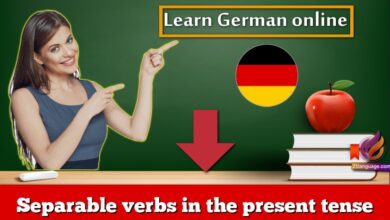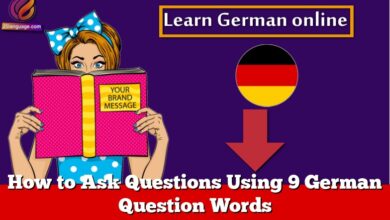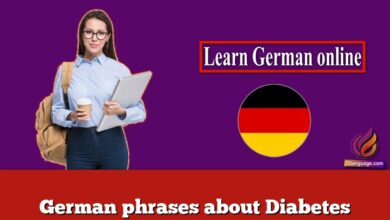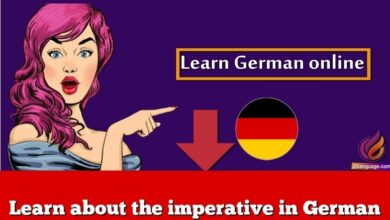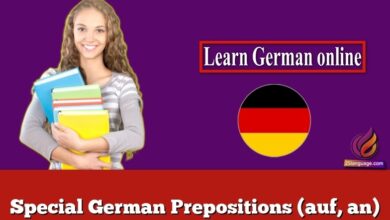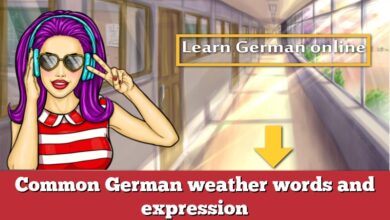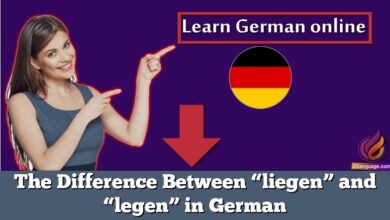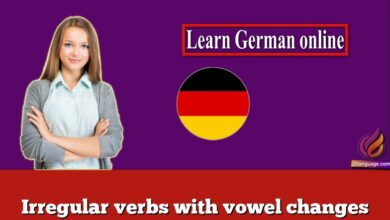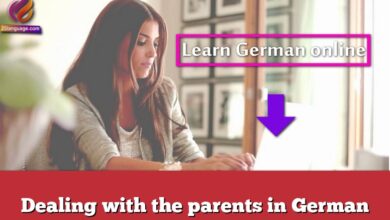Difficult Correlative Conjunctions in German
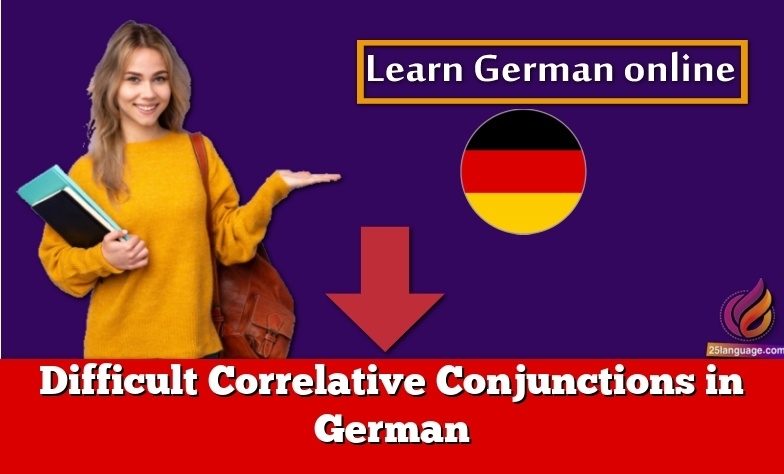
Correlative conjunctions in German are called zweigliedrige Konjunktionen in German, meaning they are conjunctions formed by 2 parts that belong together (one part in each clause).
Difficult correlative conjunctions in German are:
- Adversative/concessive: zwar …, aber/doch … (but/[al]though)
- Adversative negative: nicht …, sondern … (not …, but …)
- Copulative: nicht nur …, sondern auch … (not only … but also …), sowohl …, als auch … (both … and …)
1. zwar …, aber/doch …
This one is the most used but also the most difficult one to explain. It expresses that something (positive) is there or has happened (the “concession”) but there is also something negative to it or something that has not (yet) happened.
The aber/doch part may co-occur in the same clause with the adverb trotzdem in order to put more emphasis on the adversative clause.
Doch is somewhat more formal than aber.
Examples:
- Daniel ist zwar Deutscher, aber er ist nicht in Deutschland aufgewachsen. (D. is German but he didn’t grow up in Germany./Although D. is German, he didn’t grow up in Germany.) → Result: He doesn’t speak German like a German does (who grew up in Germany).
- Wir haben zwar aufgepasst, doch wir haben es trotzdem noch nicht verstanden. (We did pay attention, but we still haven’t understood it.)
2. nicht …, sondern …
This conjunction is similar to point 1 but the difference is: the first clause is negative, and zwar does never appear in the same sentence as sondern. The second clause expresses the affirmative part.
If the negation refers to a noun it becomes kein.
Examples:
- Ich komme nicht aus Deutschland, sondern aus Österreich. (I am not from Germany but from Austria.)
- Sie möchte keinen Tee, sondern Kaffee! (She doesn’t want tea but coffee!)
3. nicht nur …, sondern auch …/sowohl …, als auch …
These two conjunctions express the same thing: that both clauses are affirmative. The difference: the first one can be used both for positive and negative sentences (for emphasis, you can add noch in the second clause after sondern auch).
Sowohl …, als auch … is only for positive sentences and it sounds somewhat more formal.
Examples:
- Der Kurs war nicht nur teuer, sondern auch (noch) langweilig! (The course was not only expensive but also boring!)
- Ich habe nicht nur meine Hausaufgaben gemacht, sondern auch (noch) die Wohnung aufgeräumt. (Not only I’ve done my homework but I’ve also tidied up the flat.)/Ich habe sowohl meine Hausaufgaben gemacht, als auch die Wohnung aufgeräumt. (I did both my homework and tidy up the flat.)
Extensive Guide to German Conjunctions
German conjunctions give sentences life and make the language come alive. In the German sentences using conjunctions below, you can see that all of the conjunctions are necessary for the sentence to give you a bigger picture of the situation.
-
- Du bist wirklich sehr hübsch, aber ein bisschen zu klein.
You’re really pretty but a bit too small.
- Du bist wirklich sehr hübsch, aber ein bisschen zu klein.
-
- Ich musste zu meiner Frau nach Hause, weil sie krank ist.
I had to go home to my wife because she is sick.
- Ich musste zu meiner Frau nach Hause, weil sie krank ist.
- Er hat nicht auf seine Eltern gehört, deshalb hat er Hausarrest.
He didn’t listen to his parents and therefore he is on house arrest.
Throughout this article, you’ll see even more German conjunctions examples like the ones above.
If you’re wondering how to learn German conjunctions effectively and with as much ease as possible, you’re in the right place!
Conjunctions are essential not only in German, but in every language. Without them, we would sound pretty ridiculous. Our sentences would be short, and things like a higher level of education and speech wouldn’t be possible.
If learning and listening is your thing, then check out our free lesson about conjunctions.
Conjunctions allow you to make more complex constructions and more complicated statements. They help you to explain situations and thoughts, and create more difficult questions. Thus, in German, when to use conjunctions is an essential concept to grasp.
Coordinating vs. Subordinating Conjunctions
In German grammar, conjunctions come in two types: German coordinating conjunctions and German subordinating conjunctions. The first type coordinates two clauses that are equally important, while the second type subordinates one clause to another.
There’s a special grammar case that you need to remember when using them; German conjunctions and word order go hand-in-hand. In short, there are German conjunctions that don’t change word order, and German conjunctions that change word order.
When you use subordinating conjunctions, make the verb go to the end of the clause that is introduced by the conjunction. When using coordinating conjunctions, the verb stays in the same position. Usually, this is the second position after the subject in the sentence (usually, not always).
In the next sections, we’ll present you with both coordinating conjunctions and subordinating conjunctions. To know which one belongs to which type, we’ll mark them appropriately:
- Coordinating conjunctions will be signed with a ‘C’
- Subordinating conjunctions will be signed with an ‘S’
Before you set out to learn German conjunctions, check out our article about general German sentence order. It’s important to have these basics down before you can begin understanding German conjunctions!
2. German Correlative Conjunctions
Und (C)
Meaning: And
Example:
Ich bin ein netter Mensch und du bist ebenso freundlich.
I’m a nice person, and you are friendly as well.
Usage: You’ll use und all the time. It’s one of the most common German conjunctions to express similar thoughts, and the most basic one. It’s also used to combine more than one adjective, verb, or noun.
Sowie (C/S)
Meaning: As well as / As soon as
Example:
Wir kaufen Äpfel, Birnen sowie Erdbeeren.
We buy apples, pears, as well as strawberries.
Usage: Sowie actually has two different meanings. On the one hand, it can mean “as well as,” and on the other hand “as soon as.” But it’s used more in the form of coordinating conjunction, as we explained here in the form of “as well as.”
Wie (S)
Meaning: How / As … as
Example:
Ich gehe genauso gerne essen wie ich zu Hause auch koche.
I like going out to eat the same as I like cooking at home.
Du siehst genauso gut aus wie dein Vater.
You look as well as your dad.
Usage: This is another one of the German language conjunctions that has two different forms. But in both cases, you’ll express something that’s similar. So you can compare people, things, and their attributes, with each other or activities.
Sowohl… als auch (S)
Meaning: As well as
Example:
Ich war der Besitzer sowohl von einem Auto als auch von einem Motorrad.
I was the owner of a car as well as of a motorbike.
Usage: With sowohl als auch, you can show that both facts apply. So both parts of German compound conjunctions must be true.
3. Conjunctions to Express Condition
Wenn (S)
Meaning: If / When
Example:
Wenn du heute zu mir kommst, können wir einen Film anschauen.
If you come to my place today, we can watch a movie.
Usage: You’ll use this conjunction a lot. It’s the most common conjunction to express a condition. Be aware that in English, you use “if.” But in German, there are some instances where you can’t use wenn to mean “if.” Instead, you have to use ob. Wenn is also used for “when,” but in a different connection.
Falls (S)
Meaning: In case / If
Example:
Falls die Sonne heute scheint, werden wir draußen essen.
If the sun shines today, we’ll eat outside.
Usage: Falls can be used in the same manner as Wenn and can be substituted by it.
Sofern (S)
Meaning: As long as
Example:
Wir werden dir weiterhelfen, sofern es möglich ist.
We will help you out as long as it’s possible.
Usage: Here, the second clause is always the condition for the first clause. The second clause must be fulfilled so that the first clause becomes true.
4. Conjunctions to Express Cause
Darum (C)
Meaning: Therefore
Example:
Das Auto war in keinem guten Zustand, darum hat Franz es auch nicht gekauft.
The car wasn’t in good condition, therefore Franz didn’t buy it.
Usage: The second clause expresses the cause of why the first clause was achieved (or wasn’t achieved). In the second clause, you’ll always find the reason or the explanation for the first clause. You can use this German conjunction anytime you want to express a cause.
Weil (S)
Meaning: Because
Example:
Ich gehe heute nicht zu dem Konzert, weil ich keine Lust habe.
I won’t go to the concert today, because I don’t feel like it.
Usage: Weil is probably the most used conjunction to express a cause. German sentences with conjunctions like this one are the same as in the example above. If you’re not sure which conjunction to use in a special case, this one is always right.
Da (S)
Meaning: Because
Example:
Ich gehe heute nicht auf die Feier, da ich krank bin.
I will not go to the celebration, because I am sick.
Usage: As you can see, da and weil mean the same thing and they actually express the same thing. There’s basically no differences between them, except that da is more formal than weil. So, if you’re writing a formal letter, then you should use this conjunction.
Denn (C)
Meaning: Because
Example:
Er ging nicht zu Fuß zur Arbeit, denn es war sehr kalt.
He didn’t walk to his work, because it was really cold.
Usage: Okay, here we have another conjunction that converts to “because.” You may be confused by now. While this conjunction has basically the same meaning, there is one significant difference. A denn-clause can never be at the beginning of a sentence. While sentences with weil or da can have the same meaning whether they’re in the first or second clause, a sentence constructed with denn can’t be used as such.
5. Conjunctions to Express Opposition
Aber (C)
Meaning: But
Example:
Ich bin sehr müde, aber ich mache trotzdem Sport.
I’m really tired, but I will do sports anyway.
Usage: This is certainly the most-used conjunction to express opposition.
Sondern (C)
Meaning: But / But rather
Example:
Ich fahre nicht gerne Fahrrad, sondern schwimme sehr gerne.
I don’t like riding a bike, but I like to swim.
Usage: This is used similarly to the word aber, but it indicates a higher level of education and makes your sentence stronger.
Doch (C)
Meaning: However
Example:
Ich wollte draußen spielen, doch ich musste vorher meine Hausaufgaben erledigen.
I wanted to play outside, however I had to do my homework first.
Usage: As an emphasis to doch, you can also use jedoch. Both are used equally as often as aber, but have a more formal character.
Obwohl (C)
Meaning: Although
Example:
Ich habe draußen gespielt, obwohl ich meine Hausaufgaben noch nicht erledigt hatte.
I have played outside, although I haven’t finished my homework yet.
Usage: The second clause always represents the complete opposite than what was mentioned in the first clause, and shows that something was not correct or hasn’t gone the way it was supposed to go.
6. Conjunctions to Express Purpose
Damit (S)
Meaning: So that
Example:
Ich gehe heute nicht zur Arbeit, damit wir unser Date haben können
I will not go to work today, so that we can have our date today.
Usage: This conjunction is used incorrectly by many Germans themselves, as we tend to use dass more often. This is used when you want to explain your purpose in the second clause.
Dass (S)
Meaning: That
Example:
Ich habe mir schon gedacht, dass du heute vorbei kommst.
I already thought that you would come over today.
Usage: Here we have what is probably the most-used conjunction in German ever. You’ll read and hear this word several times as it makes it easy to create sentences. Don’t get confused between das and dass. The one with only one s is the article and refers to a thing.
Um… zu (S)
Meaning: In order to
Example:
Um mit mir essen zu gehen, hat er einen Tag freigenommen.
In order to go out with me, he took a day off.
Usage: This conjunction is used similarly to dass, but has a much more formal character and looks a bit more difficult to use. It’s one of the more complex German conjunctions in terms of grammar and usage.
7. More Conjunctions: German Conjunctions Tables
The conjunctions we’ve shown you are just the first step into a complicated list of words.

We made two German conjunctions charts for you, that you can use as references. If these are still not enough for you, then we can recommend you a more official German resource.
1- German Coordinating Conjunctions Chart
| und | and |
| aber | but |
| denn | because |
| oder | or |
| sondern | but rather |
| beziehungsweise | or (precisely) |
| doch | however |
| jedoch | however |
2- German Subordinating Conjunctions Chart
| bevor | before |
| nachdem | after |
| ehe | before |
| Seit, seitdem | since |
| während | while; during |
| als | when (past) |
| wenn | when (present) |
| wann | when (question) |
| bis | until |
| obwohl | although |
| als ob, als wenn, als | as if |
| sooft | as often as |
| sobald | as soon as |
| solange | as long as |
| da | because |
| indem | by |
| weil | because |
| ob | whether |
| falls | in case |
| um…zu | in order to |
| dass | in order to |
| sodass | so that |
| damit | so that |
After all we’ve gone over, you may be wondering how to understand German conjunctions—and we’re here to tell you that the first steps are practice and patience. You will get the hang of it!

